News & Stories
2025

News
HKUST Prof. LAW Kam-Tuen Named "New Cornerstone Investigator" – Hong Kong's Only Honoree this Year
Prof. LAW Kam-Tuen, Chair Professor of the Department of Physics and the Director of Research Office at The Hong Kong University of Science and Technology (HKUST), has been named a "New Cornerstone Investigator" by the Tencent-funded New Cornerstone Science Foundation. The prestigious award will provide up to RMB 15 million over five years to support his research efforts in quantum physics.Among 35 distinguished scientists selected this year from across the nation, Prof. Law is the sole honoree from Hong Kong, underscoring HKUST’s leading role in fundamental scientific research.

Stories
Predicting the Possible: Prof. DAI Xi’s Persistent Climb to Future Science Prize
Physics unlocks many of the universe’s enigmas, thanks to the relentless dedication of many great minds. Among them is Prof. DAI Xi, the Dr William M W Mong Professor of Nanoscience and Chair Professor of Physics at The Hong Kong University of Science and Technology (HKUST). His theoretical work in condensed matter physics and topological materials research has added fresh perspectives to modern physics, earning him the prestigious 2025 Future Science Prize—widely regarded as China’s equivalent to the Nobel Prize.
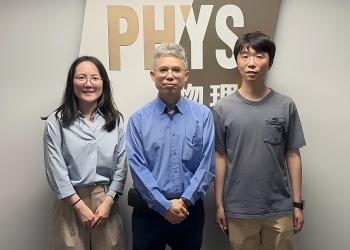
News
HKUST Scientists Achieve Breakthrough in Light Manipulation Using Gyromagnetic Zero-Index Metamaterials
The Hong Kong University of Science and Technology (HKUST)-led research team has adopted gyromagnetic double-zero-index metamaterials (GDZIMs) - a new optical extreme-parameter material – and developed a groundbreaking method to control light using GDZIMs. This discovery could revolutionize fields like optical communications, biomedical imaging, and nanotechnology, enabling advances in integrated photonic chips, high-fidelity optical communication, and quantum light sources.
Published in Nature, the study was co-led by Prof. CHAN Che-Ting, Interim Director of the HKUST Jockey Club Institute for Advanced Study and Chair Professor in the Department of Physics, and Dr. ZHANG Ruoyang, Visiting Scholar in the Department of Physics at HKUST.
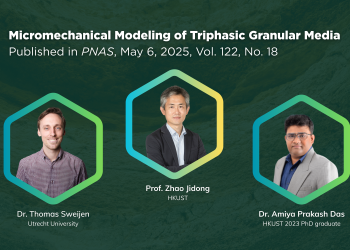
News
HKUST Researchers Develop New Model for Accurate Landslide Prediction
The Hong Kong University of Science and Technology (HKUST) announced today that a research team from its School of Engineering has developed a groundbreaking computational model to study the movement of granular materials such as soils, sands and powders. By integrating the dynamic interactions among particles, air and water phases, this state-of-the-art system can accurately predict landslides, improve irrigation and oil extraction systems, and enhance food and drug production processes.
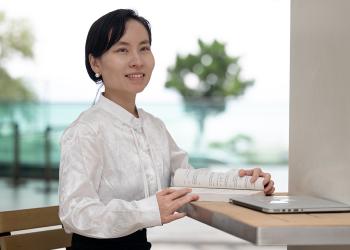
News
Quantum Leap: HKUST Physicist Awarded HKD 5 Million
Prof. SONG Xueyang, Assistant Professor of the Department of Physics at The Hong Kong University of Science and Technology (HKUST), has been awarded the prestigious 2025 Croucher Tak Wah Mak Innovation Award for her groundbreaking research in theoretical condensed matter physics. Her research promises to revolutionize energy-efficient technologies by designing materials with unprecedented control over electricity and heat. Prof. Song will receive HKD 5 million in funding from the Croucher Foundation to support her future research.
The “Croucher Tak Wah Mak Innovation Award”, one of the Croucher Foundation's top honors, recognizes Hong Kong's brightest young scientific minds poised to make significant breakthroughs. Recipients are selected for their distinguished doctoral work, internationally competitive research, and high-impact contributions to their fields.
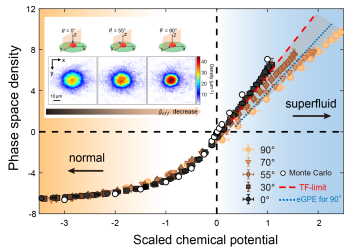
News
Unlocking the Secrets of Superfluid: HKUST Scientists Unveil How Dipolar Interactions Shape Two-Dimensional Superfluid Behavior
In a recent study, an international team of physicists, led by Prof. JO Gyu-Boong from the Department of Physics at the Hong Kong University of Science and Technology (HKUST) has made a significant observation of the BKT phase transition in a 2D dipolar gas of ultracold atoms. This groundbreaking work marks a major milestone in understanding how 2D superfluids behave with long-range and anisotropic dipolar interactions.
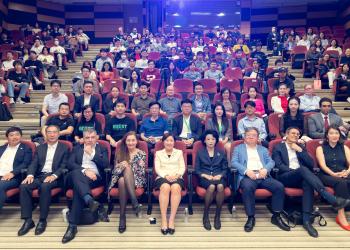
News
Meet Nobel Laureates at HKUST: Where Curiosity Connects with Global Scientific Excellence
The Hong Kong University of Science and Technology (HKUST) recently hosted an engaging dialogue featuring three Nobel Prize winners, drawing nearly 200 students, faculty members and guests on campus, and an additional 2,000 online viewers from sister institutions across Mainland China. The event highlighted HKUST’s dedication to fostering cross-disciplinary innovation, and bridging the local scientific community with global thought leaders.
As part of the Hong Kong World Youth Science Conference and Xiang Jiang Nobel Forum this year, the event titled “Together with the Scientists – Nobel Laureates Visit HKUST” took place on April 14 in collaboration with the Hong Kong Alumni Association of Beijing Universities. The program showcased the groundbreaking insights from three distinguished laureates:
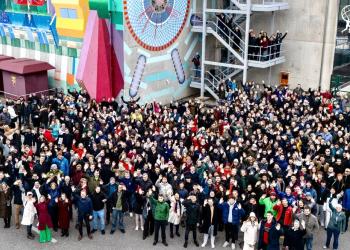
News
"Oscars of Science" Announces Winners: HKUST Celebrates Shared Victory in Breakthrough Prize in Fundamental Physics
Scientists from the Hong Kong University of Science and Technology (HKUST) are among the researchers worldwide honored with the 2025 Breakthrough Prize in Fundamental Physics, often referred to as the "Oscars of Science." This prestigious recognition was presented to the A Toroidal LHC ApparatuS (ATLAS) Collaboration at the European Organization for Nuclear Research (CERN) for its groundbreaking studies on high-energy collisions at the Large Hadron Collider (LHC). This recognition highlights a decade of dedicated research and innovation by the HKUST researchers, who have contributed significantly to the ATLAS Collaboration's achievements, including the discovery of the Higgs boson, commonly known as the "God Particle", and searches for new physics beyond the Standard Model of Particle Physics.








